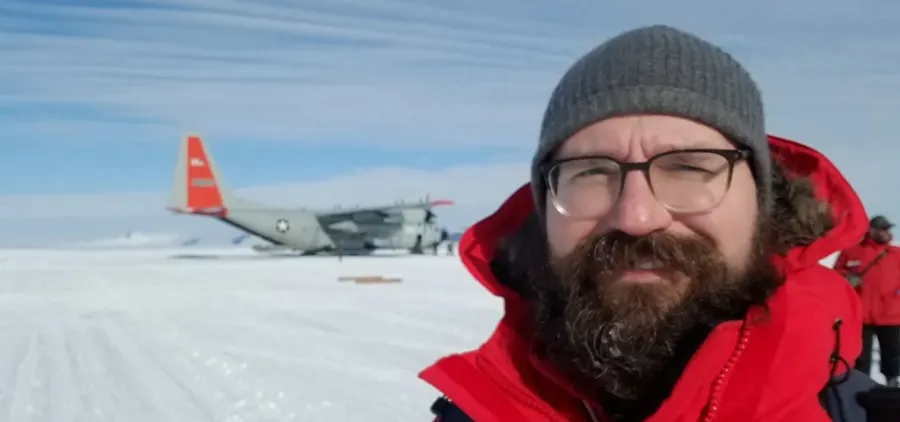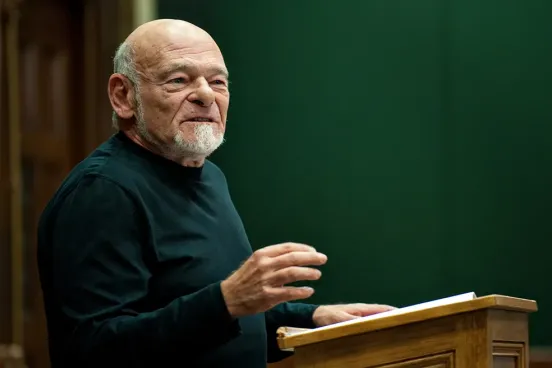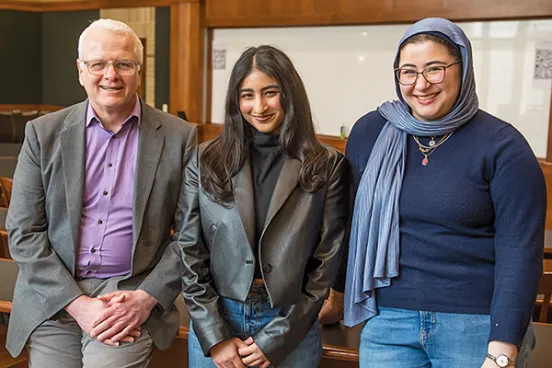
Ted Kill, ’07, covered a lot of ground between Michigan Law and his arrival in Antarctica, when he travelled to the continent as part of an interagency federal government inspection team.
The way he tells it, his journey to the bottom of the earth started with a clerkship at the International Court of Justice that he secured through Michigan Law, which served as a bridge to joining the State Department’s Office of the Legal Adviser.
In his role at State, Kill has litigated international disputes over everything from aircraft parts to eight-million-year-old bones, worked on the controversial Keystone XL pipeline under two administrations, and much more. His assignments have been so broad that it’s tough to list them on the spot, but Kill also counts representing the United States at the International Whaling Commission and the Arctic Council, as well as helping negotiate instruments for the resettlement of vulnerable Afghan nationals, among the highlights of more than a dozen years of public service.
In February 2020, Kill served as deputy team leader for a U.S. Antarctic inspection team tasked with checking research bases for compliance with the Antarctic Treaty and its Environmental Protocol. The agreement went into force in 1961, setting aside the continent for peaceful scientific research and banning the use of military resources for non-scientific purposes. While claimant states did not renounce their claims, no acts or activities while the treaty is in force can be used to support any territorial claim.
“If you go back to 1959, there were seven claimants, and there was a sense that it would be better if Antarctica were taken off of the geo-political chessboard,” says Kill. “And the idea behind the Antarctic Treaty was to say, ‘Let’s just cool it; nobody can live there, so let’s preserve it for peace and science.’ Not to use a pun— it’s what everybody says—the idea was to freeze the claims.
Under Article VII of the Antarctic Treaty and Article 14 of the Environmental Protocol, every consultative party has the right to inspect any station on the continent to ensure compliance, and the U.S. has conducted 15 inspections since the treaty went into force. During the 2020 expedition, Kill and the delegation visited bases operated by South Korea, China, and Italy.
Though one might assume these inspections are fraught with geopolitical tension, cooperation runs deep amongst Antarctic-based scientists and support staff.
“Of course you are looking for violations, but you are also there to reinforce the spirit of the treaty. The way the inspection reports are written is mainly to help identify steps that could be considered in order to make each station even better.”
According to Kill, this is a manifestation of the Antarctic spirit. “To a certain extent, you have to get along in Antarctica because if you don’t, you’ll freeze and die.”
The harshness of life in Antarctica was clear even before Kill arrived, when travel to McMurdo Station—a U.S. base that is also the largest settlement on the continent—was delayed for two days due to weather conditions. But getting to McMurdo was only the beginning. Travel to the South Korean station required hours on a helicopter flight each way, with a stop at a fuel depot so remote that it needed to be dug out of the ice.
To arrive at the Italian and Chinese installations, Kill and his colleagues traversed the southernmost sea on earth, the ice-packed Ross Sea. They traveled in the U.S. Coast Guard’s only heavy icebreaker, the Polar Star, which can break through ice up to 21 feet thick. When they arrived at the stations, however, the delegation received warm welcomes.
“The Italians are famous in Antarctica for their affogato, the espresso with ice cream in it, and they also have great Italian cheese and pasta. The Koreans had cookies set out for us and seemed to enjoy showing us around. The Chinese were very nice and receptive, and we gave them an orange, which they hadn’t had in many months, so that was well received.”
Kill first began working on Antarctic issues when he started in the Office of the Legal Adviser’s Office of Oceans and International Environmental Scientific Affairs in 2016. In 2019 he was named chair for legal, policy, and institutional matters of the Antarctic Treaty Consultative Meeting (ATCM), the annual meeting that was established under the treaty as a forum to discuss issues and adopt legally binding measures to govern Antarctica.
As chair, he helps manage the paper process in advance of the meeting, works to build consensus during negotiations, and prepares sections of the ATCM’s official report for the annual meeting.
“There’s a flurry of activity leading up to the meeting, and I review all the papers and start to get an idea about where there is consensus because it’s really a consensus-based organization,” he says. “We pride ourselves on how well we’re able to work together.”
Though Kill emphasizes his gratitude for a rewarding career at the State Department, the inspection mission is a standout. “It was a long way from Hutchins Hall, and there’s no question it’s the coolest thing I’ll do in my career. It was the experience of a lifetime.







